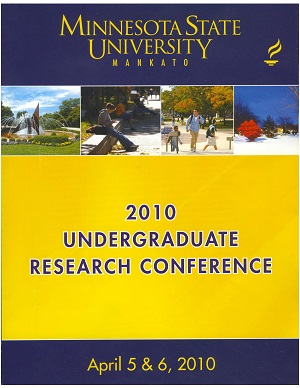Beowulf: God, Men and Monsters
Location
CSU 204
Start Date
5-4-2010 1:00 PM
End Date
5-4-2010 3:00 PM
Student's Major
English
Student's College
Arts and Humanities
Mentor's Name
Mary Johnston
Mentor's Department
English
Mentor's College
Arts and Humanities
Description
Beowulf is an Anglo-Saxon epic poem translated into Modern English in 2000 by Seamus Heaney. My paper hypothesises that the central conflict of Beowulf is the struggle between the decentralising and supernatural ways of the ancients (Shield Sheafson, Grendel, and Grendel’s Mother) and the centralising and corporeal values of the modern heroes (Hrothgar, Beowulf, and Wiglaf.) The poet traces a definitive move away from the ancient’s pagan heroic values to his own Christian heroic values. However, as in the poet’s contemporary culture, certain pagan traditions, such as familial fidelity, persist in Beowulf. The poet’s audience, the Anglo-Saxons, honoured their pagan ancestors through story telling. The Christian leadership discouraged story telling since their ancestors were pagan and thus beyond salvation. The poet needed a subtle means of dealing with the obviously pagan and foreign content of the Ur-Beowulf. In Beowulf, he simultaneously acknowledges God’s will and the heroism of their Norse ancestors. In addition, since the poet had a limited knowledge of Germanic and Norse life, he tells the story through his own Anglo-Saxon perspective.
Beowulf: God, Men and Monsters
CSU 204
Beowulf is an Anglo-Saxon epic poem translated into Modern English in 2000 by Seamus Heaney. My paper hypothesises that the central conflict of Beowulf is the struggle between the decentralising and supernatural ways of the ancients (Shield Sheafson, Grendel, and Grendel’s Mother) and the centralising and corporeal values of the modern heroes (Hrothgar, Beowulf, and Wiglaf.) The poet traces a definitive move away from the ancient’s pagan heroic values to his own Christian heroic values. However, as in the poet’s contemporary culture, certain pagan traditions, such as familial fidelity, persist in Beowulf. The poet’s audience, the Anglo-Saxons, honoured their pagan ancestors through story telling. The Christian leadership discouraged story telling since their ancestors were pagan and thus beyond salvation. The poet needed a subtle means of dealing with the obviously pagan and foreign content of the Ur-Beowulf. In Beowulf, he simultaneously acknowledges God’s will and the heroism of their Norse ancestors. In addition, since the poet had a limited knowledge of Germanic and Norse life, he tells the story through his own Anglo-Saxon perspective.
Recommended Citation
Bartz, Emily. "Beowulf: God, Men and Monsters." Undergraduate Research Symposium, Mankato, MN, April 5, 2010.
https://cornerstone.lib.mnsu.edu/urs/2010/oral-session-07/1




